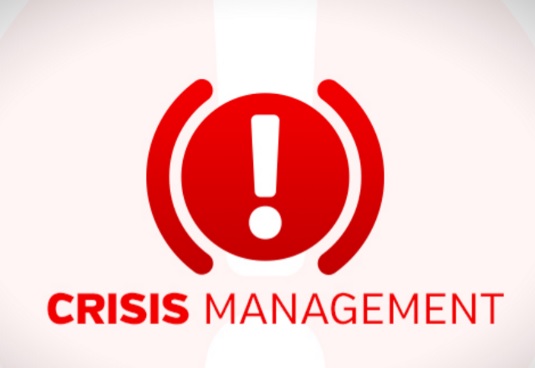Course Details
Your Growth, Our Mission

Course Description
The Training Course Will Highlight ?
At the end of this course, participants will have:
- Built a comprehensive crisis management plan.
- Developed strong crisis communication and leadership skills.
- Practiced decision-making under pressure through simulations and role-plays.
- Gained actionable insights from real-world crisis case studies.
- Learned how to continuously improve crisis preparedness for future challenges.
Participants will leave the course with detailed templates, tools, and resources to apply directly in their organizations.
Training Objective
At the end of this course, participants will have:
- Built a comprehensive crisis management plan.
- Developed strong crisis communication and leadership skills.
- Practiced decision-making under pressure through simulations and role-plays.
- Gained actionable insights from real-world crisis case studies.
- Learned how to continuously improve crisis preparedness for future challenges.
Participants will leave the course with detailed templates, tools, and resources to apply directly in their organizations.
Target Audience
This course is designed for professionals who may be responsible for managing or responding to crises within their organizations. The following groups will particularly benefit from this training:
Senior Executives and Board Members: To understand strategic crisis management and ensure corporate resilience.
Crisis Management Teams: Including heads of departments such as risk management, legal, public relations, and security.
Emergency Response Coordinators and Planners: Responsible for crafting and executing emergency and crisis management plans.
Public Relations and Communication Officers: To learn how to handle media, public relations, and reputation management during crises.
HR and Personnel Managers: Dealing with employee safety, morale, and communication during crisis scenarios.
Government Officials and Policy Makers: Especially those involved in public safety, disaster preparedness, and emergency response planning.
Business Continuity and Risk Managers: To ensure ongoing operations and organizational recovery during and after a crisis
Training Methods
This course is designed to be interactive and engaging, with a mix of the following methods:
· Lectures and Presentations: Introducing key concepts, strategies, and best practices.
· Workshops and Group Discussions: Collaborating on case studies and crisis management scenarios.
· Practical Exercises: Simulations, role-playing, and hands-on crisis management planning.
· Case Studies: Real-life examples to explore both successful and failed crisis management efforts.
· Live Simulations: Crisis scenario-based exercises that challenge participants to apply what they’ve learned in real-time.
Daily Agenda
Day 1: Foundations of Crisis Management
1. Introduction to Crisis Management
- Definition and types of crises (internal vs. external, sudden vs. smoldering)
- Importance of crisis management in modern organizations
- Case studies: Famous crises and how they were (or weren’t) managed well
2. Crisis Lifecycle
- The stages of a crisis: pre-crisis, crisis, post-crisis
- Identifying signals of a potential crisis
- Crisis escalation and tipping points
3. Crisis Management Frameworks
- Best practices and established crisis management frameworks (e.g., ISO 22301, BCM standards)
- Developing a tailored crisis management model for your organization
Day 2: Crisis Planning and Risk Assessment
1. Risk Assessment and Crisis Prevention
- Techniques for identifying and assessing risks
- Mapping out organizational vulnerabilities
- Scenario planning and likelihood vs. impact analysis
2. Building a Crisis Management Plan
- Components of an effective crisis management plan
- Roles and responsibilities in a crisis management team
- Developing crisis response protocols, triggers, and procedures
3. Creating a Crisis Response Team (CRT)
- Team structure and selecting the right people for your crisis response
- Training and preparing the CRT for different types of crises
- Internal coordination and chain of command
Day 3: Crisis Communication and Stakeholder Management
1. Effective Crisis Communication
- Importance of timely and transparent communication during a crisis
- Best practices for communicating with employees, stakeholders, and the public
- The role of social media and traditional media in crisis communication
2. Media Handling and Public Relations
- Handling media inquiries and interviews under pressure
- Press release drafting and crisis press conference management
- Preventing misinformation and handling social media backlash
3. Stakeholder Engagement
- Identifying and managing key internal and external stakeholders
- Communicating with regulators, customers, investors, and partners
- Managing corporate reputation during a crisis
Day 4: Crisis Leadership and Decision-Making
1. Leadership in Crisis
- Characteristics of effective crisis leaders
- Maintaining clarity, authority, and calmness under pressure
- Decision-making frameworks for high-stress, fast-paced situations
2. Psychological and Emotional Aspects of Crisis Management
- Managing team morale and stress during a crisis
- Understanding and addressing the human impact of crises
- Leading with empathy while maintaining control and direction
3. Crisis Response in Real Time
- Time-sensitive decision-making strategies
- Delegation and trust-building within crisis teams
- Balancing operational demands with ethical considerations
Day 5: Post-Crisis Recovery and Analysis
1. Crisis Resolution and Business Continuity
- Transitioning from crisis management to recovery
- Ensuring business continuity and operational resilience
- Rebuilding trust and repairing relationships with stakeholders
2. Post-Crisis Evaluation and After-Action Review
- Conducting a thorough post-crisis analysis and lessons-learned session
- Identifying systemic issues and making improvements for future crises
- Updating the crisis management plan and ensuring it evolves
3. Resilience Building and Future Crisis Preparedness
- Building a culture of preparedness and resilience
- Continuous training, testing, and auditing of crisis response plans
- Incorporating new risks (e.g., cybersecurity, climate change) into crisis planning
Accreditation
BTS attendance certificate will be issued to all attendees completing minimum of 80% of the total course duration.
Quick Enquiry
Request Info
Related Courses
Your Growth, Our Mission

